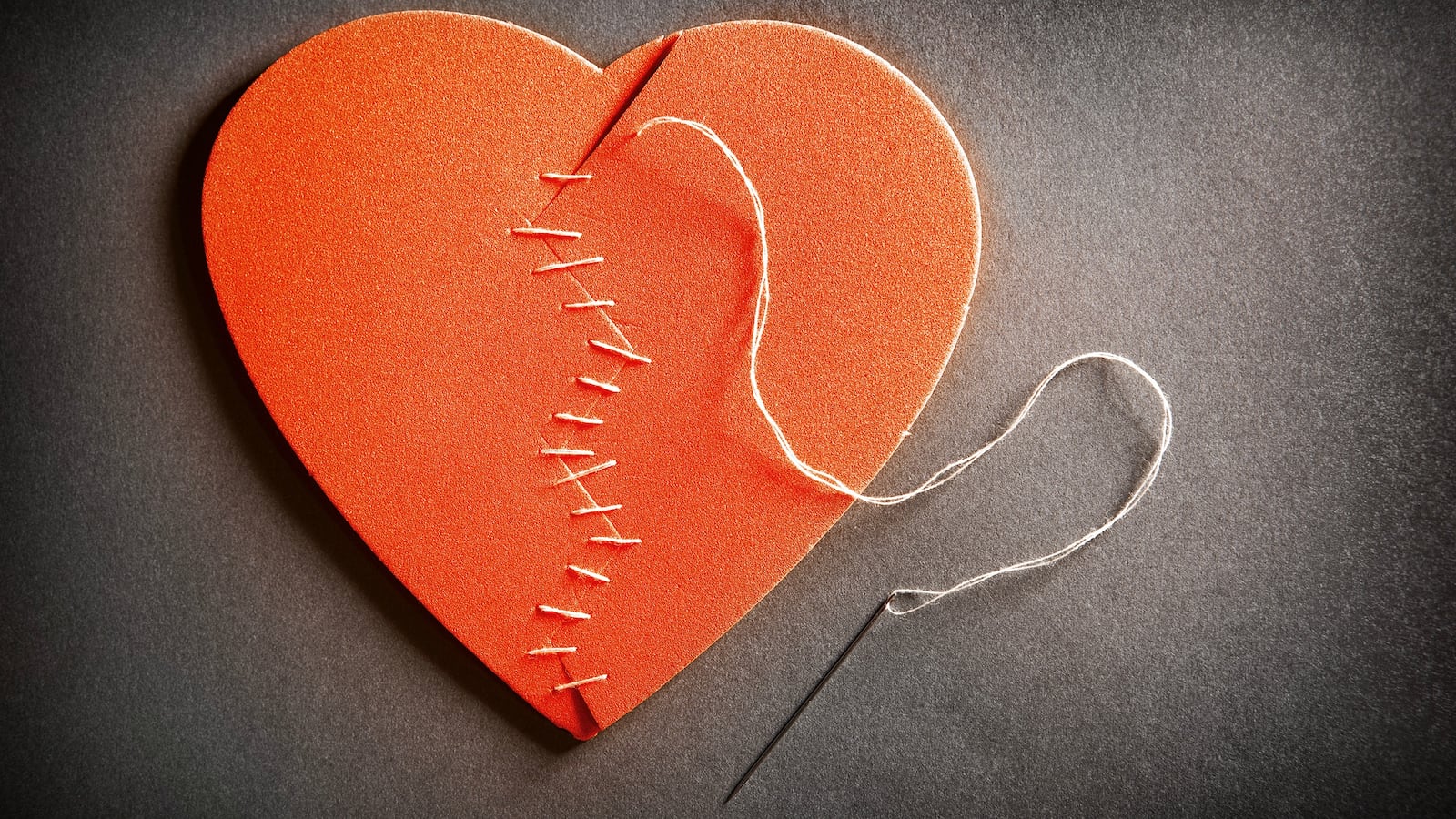Breaking up is hard. Really hard. After the boxes of Kleenex, morosely stalking social media, hours of telephone calls, and pints of ice cream, what’s a brokenhearted person supposed to do?
Guy Winch has dedicated his career to “emotional science.” The New York-based psychologist’s new book, How to Fix a Broken Heart, chronicles how to get over a breakup as quickly and painlessly as possible.
That doesn’t mean, however, that it’ll be easy, or that you’ll wake up one day without wanting to listen to “You Oughta Know” countless times in a row.
“The thing about recovering from heartbreak is that you aren’t aware of the emotional injuries you’ve sustained,” Winch told The Daily Beast. “We tend to think that we’re just hurt. We neglect how aspects of our lives are impacted by a breakup.”
It helps to understand why our brains and bodies disintegrate in the aftermath of a breakup. Think about how you introduce yourself at parties: Perhaps it’s by your job, or where you go to school. Part of becoming a couple is the fact that your identity undergoes a fundamental change, where you define yourself in relation to your partner—there’s a reason why some people call that person your other half.
“When we enter couplehood, our identity goes through a change, from ‘I’ to ‘we,’” Winch said. That change in identity is crucial to how we identify ourselves to the world: We went on vacation, we got a puppy, we made dinner.
But when the “we” dissolves, it can feel like the very core of who you are has dissolved, too. “We can be left with a significant void, and you have to fill voids,” Winch said. “You can’t hold your breath and tolerate them; you have to fill them.”
Don’t just blindly trust Winch on this: Multiple studies have shown that the core of our feeling crappy upon losing a relationship has to do with our murky identification post-breakup. A 2014 study established the “we”-ism of couples; a 2006 study from relationship researcher Gary Lewandowski of Monmouth University established that breakups cause a sense of self.
It’s why people who’ve just broken up can feel so distant and lonely: They don’t feel like themselves, and they’re trying to find their sense of place. And you can’t recover until that void is filled, Winch said, because the emotional pain we feel is tied to that loss of identity.
So that’s why breakups are the worst. But how do you get over them?
Distract yourself.
Yes, you know that already. But it’s true—and it all goes back to figuring out your identity after a breakup, particularly if it was traumatic. “When you’re heartbroken, you’re really not clear about what to do [with your sudden free time],” Winch said. That can lead to hours on end of loafing around in bed, blankly speeding through bad Netflix series, and avoiding humans.
Don’t, Winch advised. “Filling those voids, reforming your sense of identity, figuring out what the new ‘me’ is going to be about”—that’s what you should do now that you’re on your own.
As eye roll-y as that might seem in the depths of despair, neuroscience shows that Winch is right—especially when the brokenhearted is the one that’s been dumped. A study published in the Journal of Neuroscience in March of last year used fMRIs to study the brains of 40 “socially rejected” volunteers, people who’d gotten dumped in the last six months. They were asked to bring two photos to the brain-imaging lab: one of an ex, another of a friend. The participants looked at these photos while a temperature-controlled device applied pressure to their arms. While their brains were being scanned, the participants were asked to rate the amount of pain they felt.
Researchers found that the parts of the brain that light up when a person is in physical pain are similar to the parts of the brain that feel emotional pain. Put simply, heartbreak hurts.
So researchers put a twist on the experiment, offering half of heartbroken souls a nasal spray that they told the participants was a “powerful analgesic effective in reducing emotional pain.” The other half were told the truth. That white lie might have seemed like magical thinking, but it worked: Not only did the “magical spray” participants feel less physical and emotional pain, the neural activity in areas linked to controlling emotion spiked, with areas connected to feeling rejected simmered down.
The lesson? The power of expectations in shaping your future, no matter how difficult it is, can be powerful for helping to deal with a breakup, more so when it’s bad.
Don’t listen to your gut.
It’s after the breakup and you’re scrolling through Instagram or Facebook when your ex pops up.
Your first instinct? More likely than not, it’s to send your ex a note—you know, just to let them know you’re thinking of them.
Yeah, right. Winch can see right through that bizarre logic, and in the depths of your brain, you probably can, too. But Winch understands, and said you should blame evolution for our wanting to avoid getting better by avoiding our ex. “We didn’t evolve to become happy,” he said. “Our mind is not that great at doing the thing that makes us avoid danger.” We get tempted by danger, and staying in touch with your ex is one of those dangerous things.
But you’re getting misled. “You’ll keep getting obtrusive thoughts of the other person. Rather than go to a social event, you’ll go through photos and texts, reopening that wound over and over again and getting miserable.
“And that’s going to make it take longer to recover.”
The reason why we might feel this strange magnetic pull to a person who may have wronged us goes back to how we identified with them. A 2015 study published in Personality and Social Psychology Bulletin showed that different people handle breakups differently, offering a rare glimpse into the fundamental grains of our personality.
There are two kinds of people in the world, the researchers found. One group has an “entity theory of personality,” or a singular, steadfast identity that defines who you are. You are the funny one, or you’re the artist, or maybe you’re the romantic. That identity, you may believe, is what has and does and always will define you. It’s a pretty stringent way of being, though, and if something shatters your world, it can become crushing to find that the truth as you know it and have constructed it might not be as stable as you thought it to be. And it’s more likely for this person to feel rejected on a very personal level after they’ve been broken up with; these are the people who will point out they’ve been with a person for months or years and that their partner knew them, so why was it that their partner had left them now if they hadn’t liked their qualities before?
The second type, the researchers found, was one that was more flexible about who they are. Their identities ebb and flow with different eras of their lives and can include multiple aspects—maybe they were a band geek with a soft spot for theater design as high schoolers, but now they were vegan yoga teachers with a side hustle building dirt bikes. This person is better able to handle a breakup because their core sense of self isn’t challenged or threatened by life changes; they take what they like or value into their new identity and just toss out the rest.
Winch’s suggestion: Take control. Cut off contact. Your ex represents safety in a past you know of, and your uncertain future is frightening. But if you recognize that you’re playing into your mind’s desire to be safe and seek out the comfort of the person you aren’t with any more, you’ll be able to get over them quicker. “Just try not to be friends with them,” Winch says. “I’m not saying you can’t erase them from your life, but nine times out of 10, you’ll be over them and won’t want to be friends with them.”
Complain—but not too much.
We’ve all been that friend at one time or another: the one that patiently listens for the umpteenth time about the exact breakdown of the last meeting with their ex, the one that feeds them ice cream and chips and wipes their snot from their sniffly face, the one that listens.
We also know that one friend who, months after the breakup, seems to obsessively talk about their breakup and how everything is terrible and analyze every minute social-media move of their ex.
Winch said that it’s important for the breakup-ee to make sure they are not “burdening” their loved ones and realizing that constantly being a slump takes a mental toll on not only you but your friends as well. “People have a statute of limitations that just kicks in at a certain point,” Winch said. “Certainly in the first few hours or weeks, there might be more heartbreak, but we have to be aware the support doesn’t come without a price.”
To be sure, you’re on to something in wanting to do a play-by-play of your past relationship that would put any sportscaster to shame. A 2005 study in Social Psychological and Personality Science asked 210 participants who’d recently gone through a breakup to analyze their relationship in two different ways: Half visited a lab and answered questions at regular intervals over the course of nine weeks; the other half filled out a survey at the beginning of the nine weeks and then again at the end. The talkers did better than the survey-takers, proving they’d undergone the complex process of “self-concept reorganization.”
In plain English: The people who talked about their feelings did best because they were able to figure out their identity post-breakup—which circles us back to the idea that the reason why breakups hurt is the loss of identity, and finding that identity provides a sense of closure that could help propel a person forward toward recovery and maybe even new love.
Winch noted that if you’re that friend—the one that’s fixated on your ex—it’s important to take a step back. “The goal of recovering from heartbreak is to diminish the presence of that person in your thoughts,” he said. “If you keep talking about them so much, you’re giving them too much stage time.”






